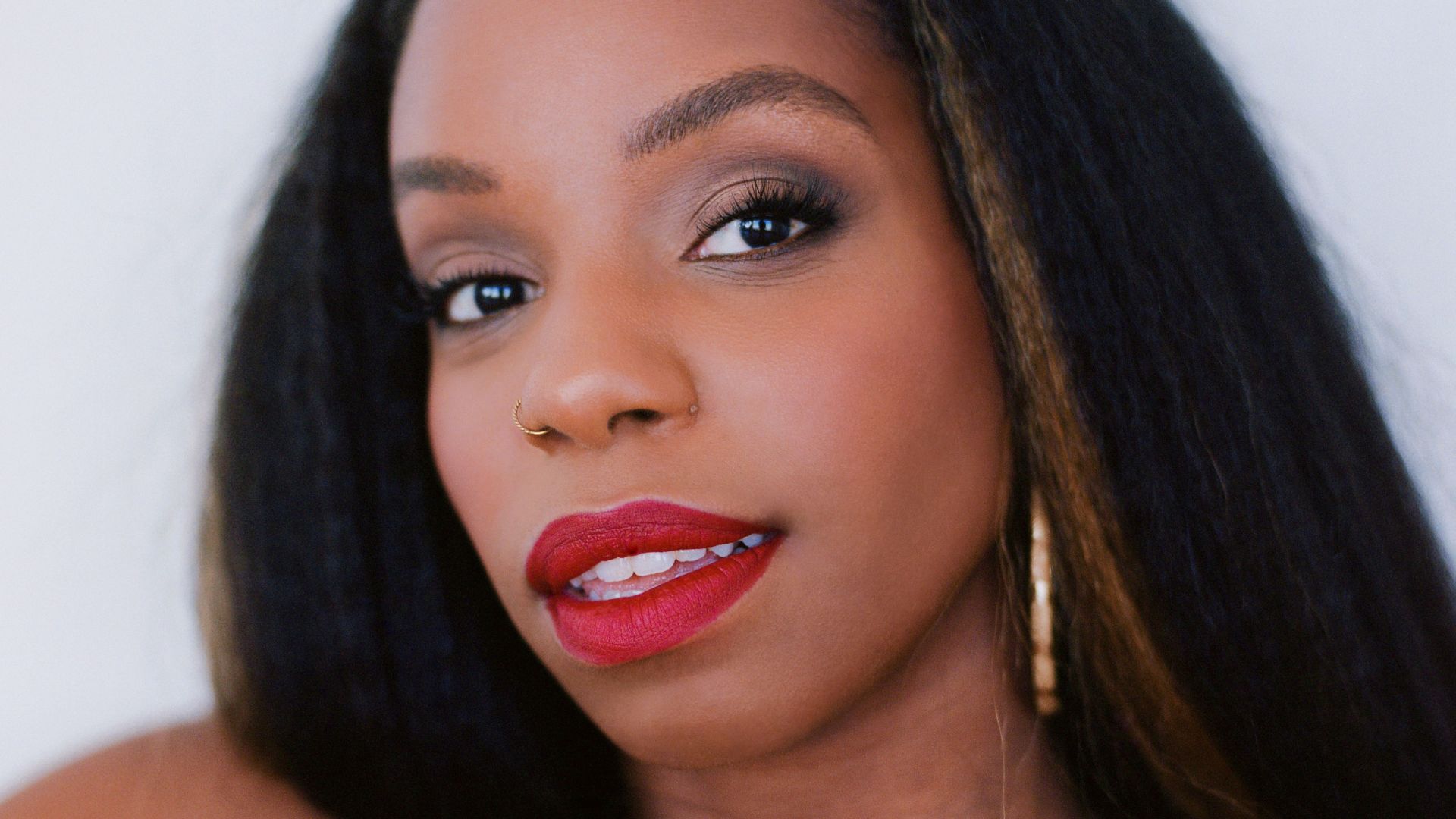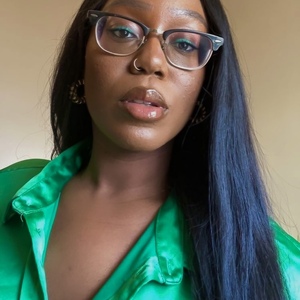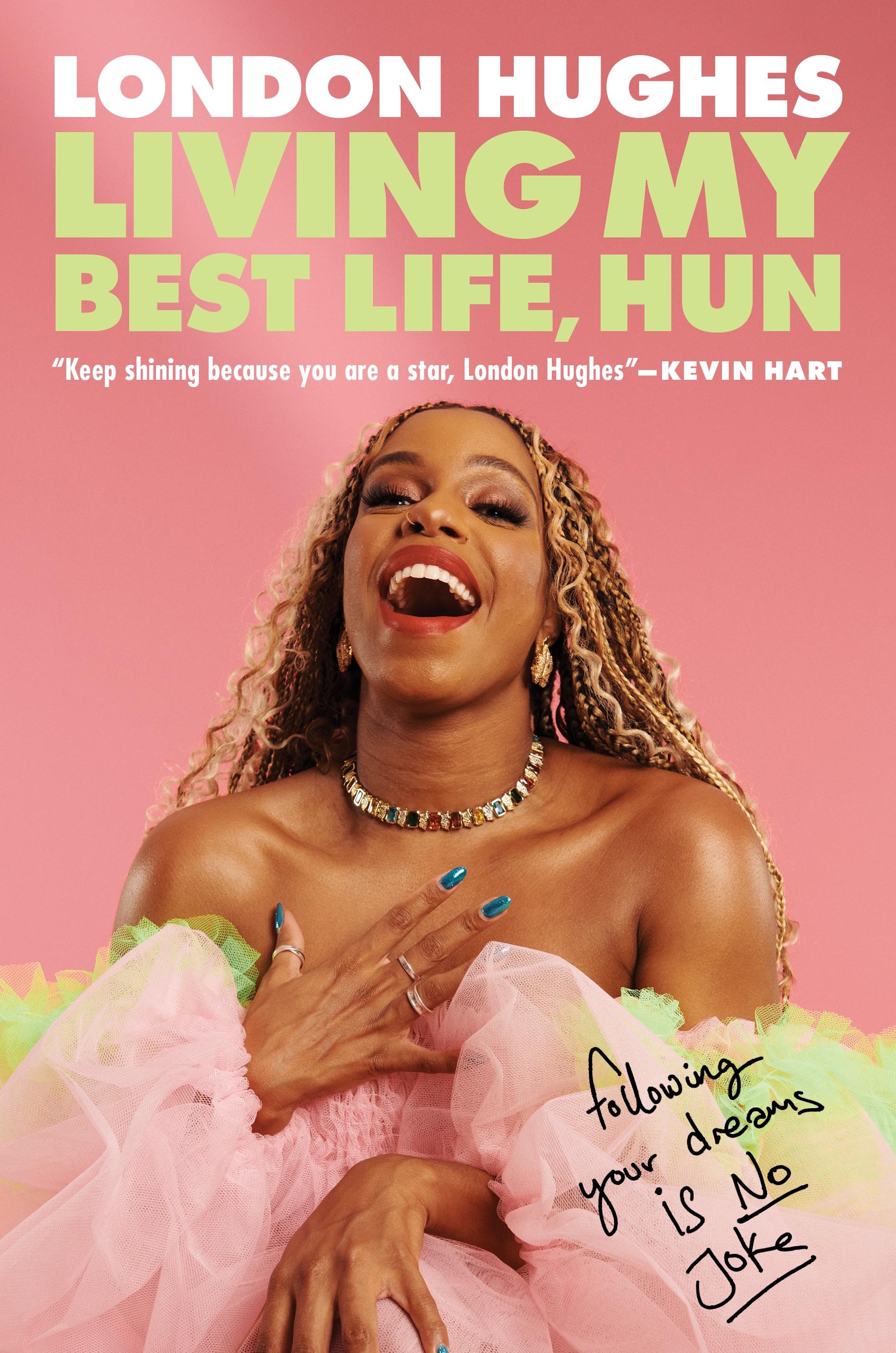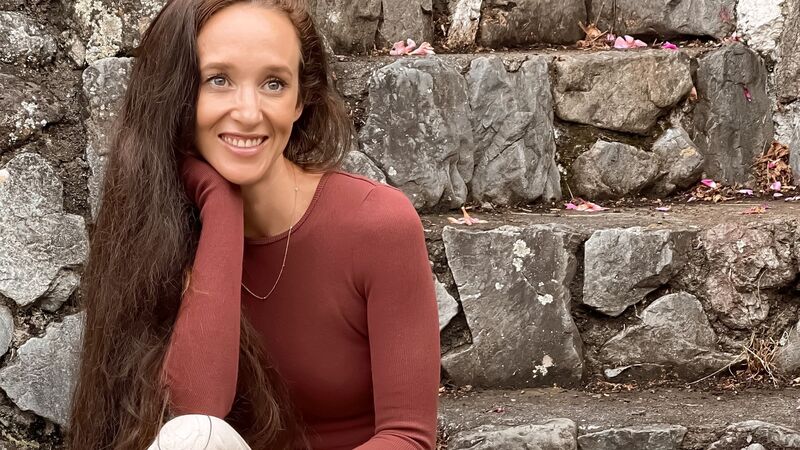You are viewing your 1 free article this month. Login to read more articles.
London Hughes discusses the comedy landscape, her memoir and acceptance
Coming from a large London family that has always known how to laugh, it was a move to the US that catapulted comedian London Hughes to success.
How many people can say everything in their life is entertainment? From the dizzying highs to the lowest lows, being able to take it all and spin it into one intensely hilarious yet revealing memoir is no easy feat. But for London Hughes, it was something she was born to do.
“My brain is wired differently, so everything is entertainment—even my own life,” she tells me from her home office in LA. “I’m such a sad person that even when I journal, I’m writing a journal like someone else is reading it.” Whether journalling about starting out on less-than-desirable TV shows or navigating school bullies and boyfriends, Hughes has always had the foresight to document her experiences and often imagined herself writing a book. As a result, no success, failure or hilarious fuck-up went amiss—and it has culminated in the comedian’s highly anticipated and raucously funny memoir, Living My Best Life, Hun, which charts everything from birthday parties gone wrong to family drama and Hughes’ rise to the top.
“I wrote a book for fun about six years ago, and I just kept writing and writing,” she shares. “I took it to my agent and although I wasn’t big enough to get a deal or anything yet, I knew I had the early bones of a book for when I was more famous—and then I got my deal six years later.”
Growing up, I thought a comedian was just a British white guy on TV
Hughes’ earlier writings inspired this book, which she says “fell out” of her in two months, as she was eager to share her story and open up about who she really is. “In interviews, I’ll say things and people will read them a certain way or it gets misconstrued or people have opinions of you that you can’t shake because they don’t know you,” she says. “And I think this book was my opportunity for me to be like, ‘This is who I am, and if you don’t know me when you read this book, then you will know me’.”
Case of identity
So, who is London Hughes? Well, she was born London Dionne Micha Stacey Stephanie Estina Knibbs-Hughes in Thornton Heath, South London, in 1989. She grew up with her parents, two elder brothers, two younger sisters and grandma. Hughes says her family is “filled with jokers”, which, somewhat surprisingly, wasn’t a word she would use to describe her early self. “I only became funny around the age of eight,” she says. “Some people might think that’s normal, but for the hilarious Hughes family, I was seriously slacking on the hahas.”
The fun-filled family, known for their humour and comedic timing, provided the baseline for the wit and humour that oozes from Hughes, even during our 40-minute overseas Zoom call. But for a Black female comedian, this boldness and confidence has had to be cultivated over many years; working in an industry that is often dominated by white, male faces is no easy feat. “Growing up, I thought a comedian was just a British white guy on TV,” she admits. “When I got older, I started seeing American comedians like Eddie Murphy and Richard Pryor, but as a little kid a comedian to me was a white guy on TV running up and down being silly, which I didn’t think I could be.”
This lack of representation is one that Hughes is happy to see changing, with a cohort of Black British comedians like Hughes reaching new heights. Hughes has been a regular on ITV2 entertainment comedy show “Don’t Hate the Playaz” and was also nominated for an Edinburgh Comedy Award in 2019 for her show “To Catch a Dick”—which went on to become a Netflix special in 2020, produced by Kevin Hart.
[Comedy] has been controlled by the same types of people and I just think the world needs waking up. It is time for a change
“I remember I used to google comedians and see what would come up and it would be like a bunch of British white guys and then Lenny Henry. Now when you google British comedians, I come up, Mo Gilligan comes up,” she says. “So it is changing, but it’s a little too slow for my liking. I want British comedy to be seen as a mix of people. I want Black women, I want Asian women, I want Black men, I want Polish men, I want African men. [Comedy] has been controlled by the same types of people and I just think the world needs waking up. It is time for a change.”
Hughes moved to LA in 2019 and is happy to report that the US entertainment industry has welcomed her with open arms. As she sings the city’s praises, she advises Black British entertainers to move to the US and ditch “Bad vibes Britain”. “It was a shock to me when I came over to America and my director was Black, my producers Black, my managers Black, the head of the network was Black. I was used to being the token Black woman, and now I have Kevin Hart turning to me and saying, ‘You are going to be a star’. In Britain I got told, ‘Oh, I’m not sure our audience would get you’, and I’m British. I go to America and they are welcoming me with open arms and I’m not American.”
Happier Stateside
Since the star has gone Stateside, she’s found herself at the epicentre of comedy; she now counts Dave Chapelle as a friend (she had an epic birthday party at his home, which she spills the tea on in the book), is working on numerous projects and, of course, is gearing up for the release of Living My Best Life, Hun, which will be published in September by Quercus.
“When I wrote this book, I set myself goals,” she says. “I locked myself in my house. No social media. No going out. No alcohol, no dick. Nothing. And I said to myself, ‘You’re not allowed to leave your house’. And I just sat in this chair and focused.
Extract
Before moving to Brighton, I’d been there only for the odd weekend and to be honest I wasn’t that impressed. First, it didn’t have a sandy beach, which I think should be a prerequisite for anything called a “beach,” and second, it was lacking Black people. When we first moved there, the only people of color were me, my mum, and Countdown Dave (the first Black man on Countdown). I was worried at first about whether I’d fit in, but my mum insisted that immersing myself into Brighton life would be a good thing. “It’s good to experience different cultures,” she told me, and she was right, because up until then I really had only hung out with Black people. My old school was about 75 percent Black and Asian, and the only white people in my life were Tony Blair, my ex‑best friend Emily, and... My Grandparents. I love telling the story of my white grandparents. One day I’ll write a comedy based on their lives, because they are the definition of absolute legends. Having them in my life shaped how I view racism in Britain, and they are one of the major reasons I’m so vocal about race and diversity in my career.
“There were certain parts of the book I couldn’t wait to write, but it was also hard revisiting difficult times like the bullying stories, because I don’t think you ever really get over that and I was crying all through those chapters. Ultimately, it’s really great to have my words on paper. It’s kind of scary to know people all over the world can read it and judge me but, I don’t know, it’s freeing as well. I’m really happy with it.”











